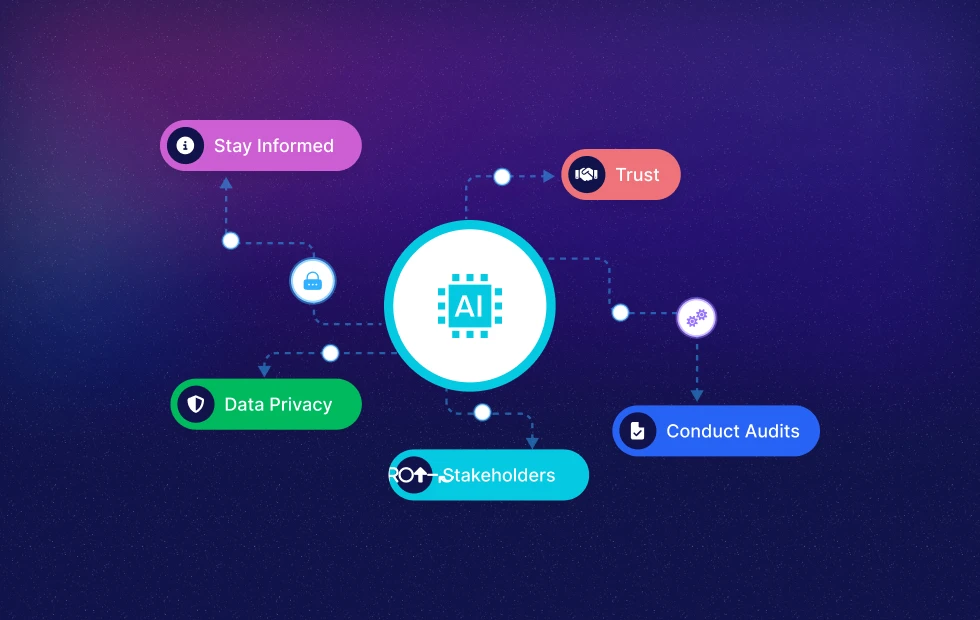
The use of artificial intelligence (AI) in hiring processes has gained significant traction, promising to enhance efficiency, reduce biases, and streamline recruitment. However, the rapid adoption of AI technologies has also raised concerns about AI compliance, fairness, transparency, and privacy. In response, various states in the U.S. have introduced legislation to regulate the use of AI in hiring. This resource explores common themes in these state laws and offer tips for organizations to ensure AI compliance.
Common AI Compliance Themes in State Legislation
- Transparency and Disclosure Many state laws require employers to disclose their use of AI in hiring to candidates. For instance, Illinois’ Artificial Intelligence Video Interview Act mandates that employers notify applicants when AI is used to evaluate their video interviews. Additionally, employers must explain how the AI works and obtain consent from the applicants.
- Bias and Fairness Legislation often focuses on preventing discriminatory practices in AI-driven hiring. States like New York have proposed bills that require employers to conduct regular audits of their AI systems to ensure they do not disproportionately impact protected classes. These audits help identify and mitigate biases that may arise from the algorithms.
- Data Privacy and Security Protecting candidate data is a crucial aspect of AI legislation. Laws typically require employers to handle personal data with care, ensuring it is stored securely and used only for intended purposes. California’s Consumer Privacy Act (CCPA) sets stringent guidelines on how businesses should collect, store, and share personal information, including data used in AI hiring systems.
- Accountability and Governance States are emphasizing the need for robust governance frameworks to oversee the use of AI in hiring. This includes assigning responsibility for compliance, maintaining detailed records of AI decision-making processes, and establishing clear protocols for addressing grievances related to AI-based decisions.
Tips for AI Compliance
- Stay Informed: Organizations should keep abreast of the latest developments in state legislation regarding AI in hiring. This can be achieved by subscribing to legal updates, participating in industry forums, and consulting with legal experts who specialize in employment law and AI.
- Implement Transparent Practices: Transparency is key to building trust with candidates and regulators. Clearly communicate the use of AI in your hiring process, including how it functions and what data it analyzes. Provide candidates with easy-to-understand explanations and obtain their explicit consent before proceeding.
- Conduct Regular Audits: Regularly audit your AI systems to detect and address any biases. This involves analyzing the outcomes of AI-driven decisions and comparing them across different demographic groups. If disparities are found, work with AI developers to adjust the algorithms and ensure fairness and AI compliance.
- Strengthen Data Privacy Measures: Ensure that all personal data collected during the hiring process is handled in accordance with state and federal privacy laws. Implement robust security protocols to protect data from breaches and misuse. Regularly review and update your data privacy policies to reflect changes in legislation.
- Engage with Stakeholders Engage with stakeholders, including employees, candidates, and regulatory bodies, to gather feedback on your AI hiring practices. This helps identify potential issues and demonstrates your commitment to ethical and compliant AI use.
Conclusion
As the use of AI in hiring becomes more prevalent, staying compliant with state legislation is essential for organizations to build trust and avoid legal repercussions. By focusing on transparency, fairness, data privacy, and governance, companies can harness the benefits of AI while ensuring ethical and legal hiring practices. Selecting the right AI vendor partner is a critical step in this process, requiring careful consideration of their reputation, compliance, transparency, bias mitigation, data security, customization, and support. Stay informed, proactive, and engaged with the evolving regulatory landscape to navigate the complexities of AI compliance in hiring successfully.